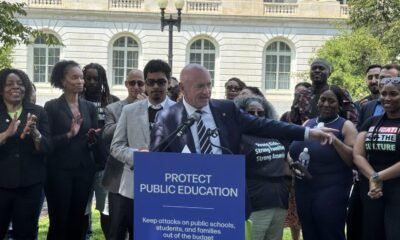Business
The Next Wave of Education Reform: Unleashing the Supply Side

The traditional school model—characterized by fixed locations, rigid schedules, and standardized staffing—was initially created for control rather than innovation. However, this structure no longer aligns with the evolving expectations of many American families.
The pandemic has intensified existing disparities within the education system. Frustrated parents have sought alternatives like learning pods, hybrid schools, and microschools. This grassroots movement has fostered a more versatile education landscape that responds better to the needs of both students and their families.
Despite this transformation, public education finance and regulation still focus on a model where a single provider manages all services under one roof. Public funding typically supports districts rather than the individual student. As a result, state agencies often monitor school outcomes rather than the nuanced journeys of each student. This disconnect highlights a fundamental issue in education today.
To cultivate new learning approaches, a modern framework for education financing is essential. Funding should follow the student rather than be tied to traditional school systems. Education savings accounts (ESAs) enable families to tailor their children’s education across various providers while maintaining public accountability.
Moreover, investment in innovative tools is crucial. These tools should facilitate diverse providers’ access to students, manage enrollments, assist parents in evaluating options, and ensure legal frameworks promote equity without enforcing uniform standards.
Additionally, the role of state governance must shift. Instead of prioritizing a specific educational model, the state should support multiple successful models, ensuring equitable access while establishing necessary safeguards. This approach avoids constricting families to inflexible options.
This evolution is already observable in states like Arizona and Florida, which have adopted flexible school choice programs. An analysis indicates a growth in private school options in these areas, unlike in states without such choice, such as California and New York, where the number of private schools is declining.
However, focusing solely on the number of schools fails to provide the full picture. A closer look at Arizona’s ESA program reveals that many families are utilizing funds not just for traditional private school tuition, but also for community colleges, online educational institutions, microschools, and homeschool co-ops.
The supply side of K-12 education in Arizona is expanding in diverse ways. Thousands of families leverage ESA funds to craft personalized learning experiences, blending various educational resources. These students don’t fit into conventional categories; they represent a new wave of educational engagement, with families at the helm.
In Arizona, there has been a notable increase in vendors catering to this diverse array of educational needs since the program was opened to all families. As parents redefine educational boundaries, more suppliers are stepping in to meet this demand.
Universal ESA programs recognize that learning extends beyond the classroom. With appropriate safeguards, such as transparency and parental consent, public funds can facilitate learning in various environments. However, these initiatives require well-coordinated systems to minimize barriers for families.
To ensure that educational choice benefits all families—especially those with limited resources—we must develop the infrastructure necessary for accessible, navigable, and sustainable options.
The push for educational choice has been a vital endeavor over the years. Yet, it is not enough to simply advocate for choice; we must also create systems that make these options easy, affordable, and effective for all students.
Susan Pendergrass serves as director of education policy at the Show-Me Institute in St. Louis, Missouri, and is a fellow at EdChoice, an organization dedicated to promoting educational freedom and choice for every student.


















